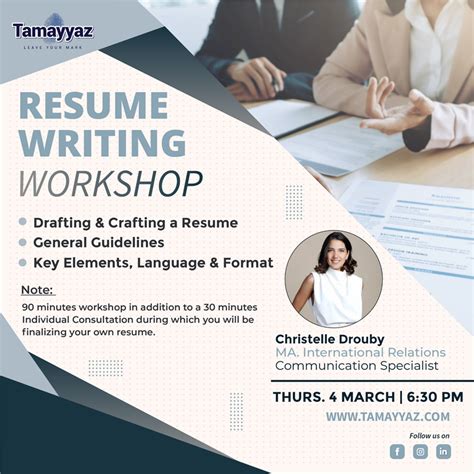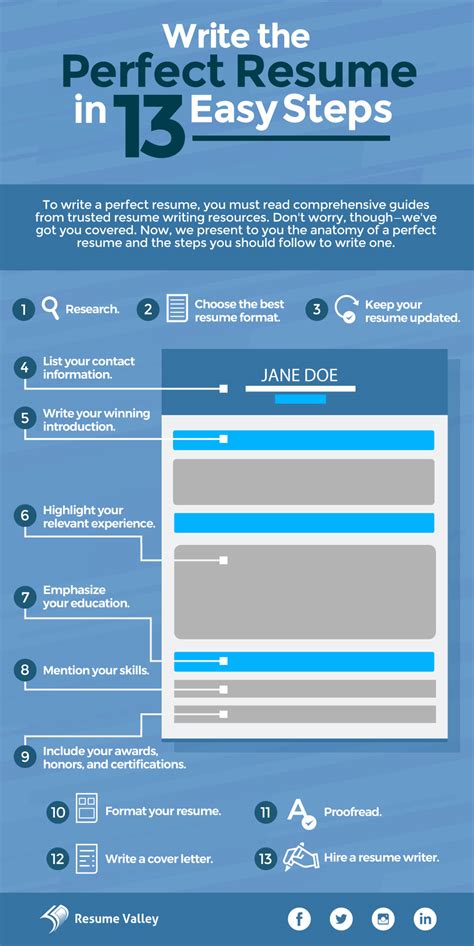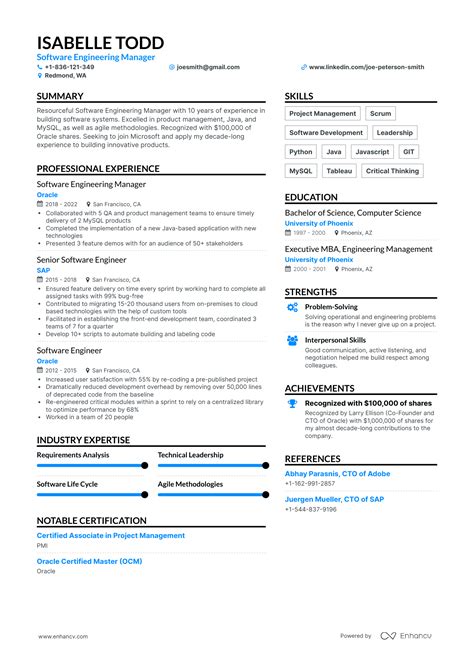5 Resume Writing Tips

When it comes to securing a job in today's competitive market, having a well-crafted resume is essential. A resume serves as a potential employer's first impression of you, and it can make or break your chances of landing an interview. With the rise of applicant tracking systems (ATS) and the sheer volume of applications that hiring managers receive, it's more important than ever to create a resume that stands out from the crowd. In this article, we'll provide you with 5 resume writing tips to help you create a compelling and effective resume that showcases your skills, experience, and achievements.
Key Points
- Tailor your resume to the specific job you're applying for by using keywords from the job description
- Use a clear and concise format with bullet points to make your resume easy to scan
- Highlight your achievements and the impact you've made in your previous roles
- Include relevant sections such as a summary or objective statement, education, and skills
- Proofread your resume multiple times to catch any spelling or grammar errors
Tip 1: Tailor Your Resume to the Job

One of the most common mistakes people make when writing a resume is using a generic template that doesn’t take into account the specific job they’re applying for. To avoid this, make sure to tailor your resume to the job description by using keywords and phrases from the posting. This will not only help your resume pass through ATS systems but also show the hiring manager that you have the skills and qualifications they’re looking for. For example, if the job description mentions “data analysis” and “project management,” make sure to include these terms in your resume, especially in your summary or objective statement.
Using Keywords Effectively
When using keywords from the job description, it’s essential to use them in context and not just as a list of buzzwords. For instance, instead of saying “proficient in data analysis,” say “utilized data analysis tools to identify trends and improve business outcomes.” This shows that you not only have the skill but also know how to apply it in a practical way. Additionally, be sure to use action verbs such as “managed,” “created,” and “developed” to describe your achievements and responsibilities.
Tip 2: Use a Clear and Concise Format

A clear and concise format is essential for making your resume easy to scan and understand. Use bullet points to break up large blocks of text and make your achievements and responsibilities stand out. Avoid using overly complex language or jargon that may confuse the reader. Instead, use simple and concise language that effectively communicates your message. Also, be sure to use white space effectively to make your resume easy to read and visually appealing.
Choosing the Right Font and Size
When it comes to choosing a font and size for your resume, it’s essential to use a standard font such as Arial, Calibri or Helvetica and a size between 10 and 12 points. Avoid using fonts that are too ornate or difficult to read, as they may give the impression that you’re trying too hard to stand out. Instead, focus on using a clean and professional font that allows your achievements and experience to shine through.
Tip 3: Highlight Your Achievements
Rather than just listing your job responsibilities, focus on highlighting your achievements and the impact you’ve made in your previous roles. Use specific numbers and metrics to demonstrate the value you’ve added to your previous employers. For example, instead of saying “increased sales,” say “increased sales by 25% within 6 months.” This shows that you’re a results-driven professional who can make a real difference in the organization.
Using Action Verbs and Quantifiable Results
When describing your achievements, be sure to use action verbs such as “managed,” “created,” and “developed” to describe your responsibilities and accomplishments. Additionally, use quantifiable results such as “increased sales by 25%” or “reduced costs by 30%” to demonstrate the impact you’ve made. This will help you stand out from other candidates and show the hiring manager that you’re a high achiever.
Tip 4: Include Relevant Sections
There are several sections that you should include in your resume, depending on your level of experience and the job you’re applying for. These may include a summary or objective statement, education, skills, and relevant tools or certifications. Make sure to tailor these sections to the job description and highlight your most relevant qualifications and experience.
Writing a Strong Summary or Objective Statement
Your summary or objective statement should be a brief overview of your experience, skills, and achievements. It should entice the reader to read further and learn more about your qualifications. When writing your summary or objective statement, be sure to use keywords from the job description and highlight your most relevant experience and skills. This will help you stand out from other candidates and show the hiring manager that you’re a strong fit for the job.
Tip 5: Proofread Your Resume

Finally, make sure to proofread your resume multiple times to catch any spelling or grammar errors. A single mistake can make a negative impression on the hiring manager and hurt your chances of getting an interview. Ask a friend or family member to review your resume as well, as they may catch errors that you’ve missed.
| Resume Section | Importance |
|---|---|
| Summary or Objective Statement | High |
| Education | Medium |
| Skills | High |
| Relevant Tools or Certifications | Medium |

What is the most important thing to include in a resume?
+The most important thing to include in a resume is a clear and concise summary of your experience, skills, and achievements that are relevant to the job you’re applying for. This should be tailored to the specific job description and highlight your most relevant qualifications and experience.
How long should a resume be?
+A resume should typically be one to two pages in length, depending on your level of experience and the job you’re applying for. It’s essential to keep your resume concise and focused on the most important information, rather than trying to include everything.
What are some common mistakes to avoid when writing a resume?
+Some common mistakes to avoid when writing a resume include using a generic template, not tailoring your resume to the specific job, and including too much irrelevant information. Additionally, make sure to proofread your resume multiple times to catch any spelling or grammar errors.
